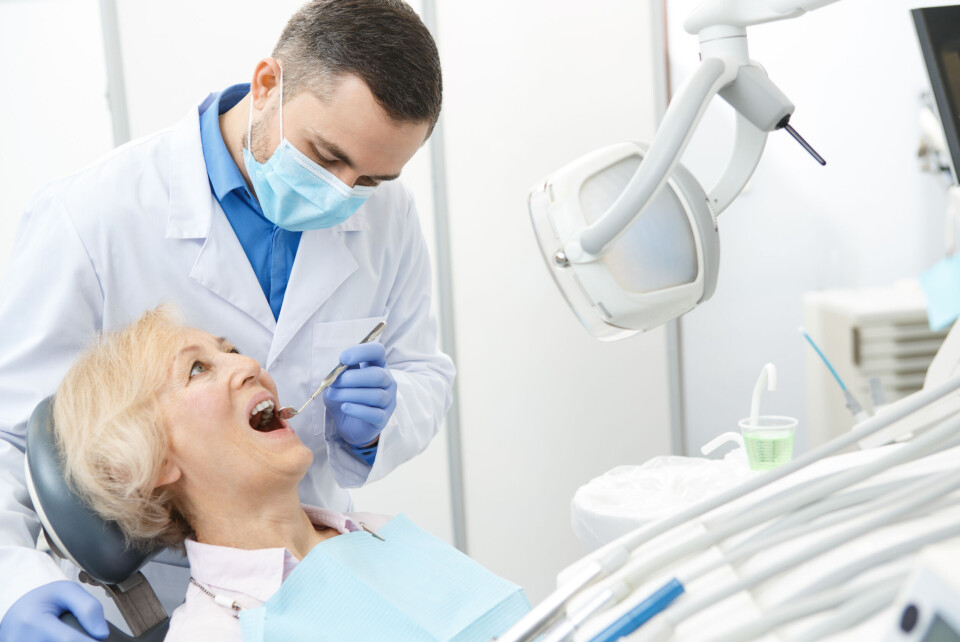-
French Google website google.fr will soon be replaced
Technology advancements have made local searches obsolete
-
French initiative transforms hotel waste into lifesaving soap
Unisoap's innovative recycling enterprise collects soap from 390 hotels in 110 cities in France to help those in need
-
French inventor develops new air purifier after daughter’s asthma attack
Particles in the air attach themselves to ionised air from the machine causing them to fall to the ground
Invisible ‘smart tooth’ monitors chronic disease, says French dentist
The new technology sends bio-markers from saliva to your phone or GP to help detect and control illness

Within two years, patients in France will have the option of fitting a ‘smart tooth’ to monitor their health, a dental surgeon has predicted.
Matthieu Minty has been working alongside researchers Hugo Maugard and Vincent Blasco to look into new technology at the I2MC Institute in Toulouse.
The trio are liaising with clinicians on a project called Valsaï, which aims to use biomarkers in saliva to detect and monitor chronic diseases.
Mouth infections travel through the blood to the heart
“The link between heart disease and oral infections is very well established and well researched,” Dr Minty told The Connexion.
Infections in the mouth, from unfilled cavities or untreated gingivitis, for example, travel through the bloodstream to the heart, where they cause disease.
Research has shown that having an oral infection raises the risk of heart disease by a factor approaching three.
The Valsaï team’s smart tooth can detect these infections, and the team has also identified multiple biomarkers for diabetes.
Smart chip glued inside tooth
“We have now developed a smart chip with a bio-captor which can permanently monitor these biomarkers and send information about a person’s health to an app on their mobile phone and to their GP.
“The bio-captor can be incorporated into a crown or a mini bridge, which is then glued to the inside of a tooth, where it isn’t visible.”
Detect chronic conditions early
Around 70% of Europe’s health budget is spent on managing chronic conditions, costing around €700billion a year, which is why detecting them early and managing them efficiently is important.
“Obviously, we are not proposing to fit crowns where they are not necessary, but one in two patients end up needing a crown eventually,” says Dr Minty.
“So for many patients that would be the ideal time to install a permanent smart tooth.
“However, the chip can also be simply glued to an individual healthy tooth, like a tiny bridge or mini-brace.”
Read more: ‘Prevention will ease healthcare crisis in France’, says minister
Realtime data for diabetes patients
The bio-captor sends information to the Valsaï platform, which analyses the data and can then send the results to pre-selected recipients: insurance companies and researchers, for example, as well as to the patient and their GP.
There are other benefits. Since the bio-captors monitor saliva in real time, diabetes patients fitted with a smart tooth would no longer need to do daily blood tests, for example.
“Being non-invasive, it is ideal for toddlers and young children, for people who have phobias of doctors or needles, for people with chaotic life-styles, or those who have limited access to primary healthcare,” says Dr Minty.
“The information collected about their blood sugar levels is sent to an app on their smartphone, which shows red when they reach critical levels.
“It can also be sent to their GP or community nurse, who can then monitor them more effectively.”
Makes patients active partners in own healthcare
Dr Minty says the smart tooth encourages patients to become much more involved in their own healthcare.
“Outcomes are always better when patients are active partners in their healthcare.
“In the past, doctors, surgeons and dentists had a tendency to feel they were the professionals and that patients had nothing to contribute to their care, but that is all changing now.
“Patient outcomes are improved when patients are active partners in their healthcare team.”
Having developed the hardware, the Valsaï team is currently researching new biomarkers, hoping to find those for degenerative and auto-immune diseases, including rheumatism and Alzheimer’s.
Read more: ‘Make patients in France part of the team to save money and lives’
‘Everything depends on next tranche of funding’
Alongside their scientific research, they are also looking for investors so they can carry out clinical testing.
“We need to test the technology on a large cohort of patients in order to move towards making it available to everyone.
“We are also going through the process of getting our developments patented.”
He says that everything depends on receiving the next tranche of funding.
“We are ready to go. We just need the investment but, in any case, we are so confident in the benefits of the ‘connected tooth’ that we think it will be available to people all over France within the next two years.”
The smart tooth will never replace dental care.
The best way to avoid the oral infections that can increase the risk of heart disease remains thorough daily brushing and flossing, plus regular dental checkups and cleaning.
Related articles
Toothbrush reinvented by French entrepreneurs to clean in five seconds
Why going to the dentist in France is a lottery
What can I do if I receive substandard dental treatment in France?
























